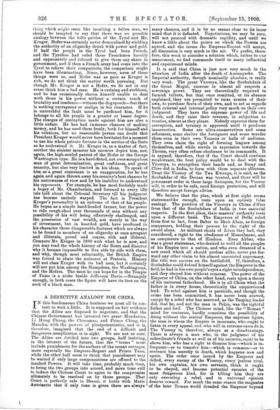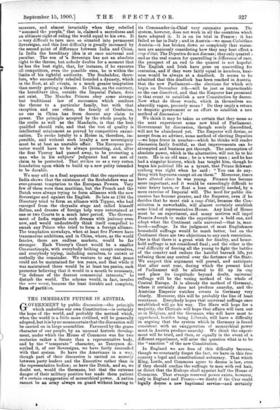A DEFECTIVE ANALOGY FOR CHINA.
IN this burdensome China business we must all be con- tent to wait a little. It is supposed on fair evidence that the Allies are disposed to negotiate, and that the Chinese Government has invested two great Mandarins, Li Hung Chang, the Chinaman, and Prince Ching, the Manchu, with the powers of plenipotentiaries, and it is, therefore, imagined that the end of a difficult and dangerous complication is in sight. We are not so sure. The Allies are divided into two groups, half insisting, in the interest • of the future, that the " terms " must include punishment for the authors of the recent outrages, more especially the Empress-Regent and Prince Than, while the other half seem to think that punishment may be waived if only large compensations are offered to the insulted Powers. It will take time, probably much time, to bring the two groups into accord, and more time still to induce the Chinese Court to agree to the compromise ultimately to be resolved on by those groups. That Court is perfectly safe in Shensi, it holds with Marie -Antoinette that if only time is given there are always many chances, and it is by no means clear to its inner mind that it is defeated. Negotiations, we may be sure, will not proceed with dramatic rapidity, and until we know a little about the points on which the Powers are agreed, and the terms the Empress-Regent will accept, all discussion is very much in the air. We prefer, there- fore, this week to consider a solution which, rather to our amazement, we find commends itself to many influential and experienced minds.
It is said that China is just now very much in the situation of India after the death of Aurungzebe. The Imperial authority, though nominally absolute, is really very weak. The great Viceroys, like the Soubandars of the Great Mogul, exercise in almost all respects a sovereign power. They are theoretically required to furnish tribute, but that once remitted, or its absence explained, they are permitted to raise armies of their own, to purchase fleets of their own, and to act as regards both external and internal policy very much on their own judgment. They have the supreme power of life and death, and they raise their revenue, in subjection to treaties, almost as they please. Nobody reproves them for corruption, and tyranny is approved until it produces insurrection. Some are ultra-conservatives and some reformers, some shelter the foreigners and some murder them even in their own Yamens or halls of audience. They even claim the right of forming leagues among themselves, and while servile in expression towards the Throne, very often refuse obedience to its commands. It is argued, therefore, that if the Court should continue recalcitrant, the best policy would be to deal with the Viceroys, to strengthen their hands and, as Bussy and Clive did in India, to form with them separate alliances. Treat the Viceroy of the Two Kwangs, it is said, as the Soubandar of the Deccan was treated, and there will be permanent order in those large Satrapies, for the Viceroy will, in order to be safe, need foreign protection, and will therefore accept foreign advice.
We believe that the plan, which at first sight seems statesmanlike enough, rests upon an entirely false analogy. The position of the Viceroys in China differs from that of the Soubandars of India in two essential respects. In the first place, their masters' authority rests upon a different basis. The Emperors of Delhi ruled from first to last, from Baber to Shah Alum, as foreign conquerors, holding their powers by the right of the sword alone. As militant chiefs of Islam they had, they considered, a right to the obedience of Mussulmans, and as conquerors to that of Hindoos. Even Akbar, who was a great statesman, who desired to weld all the peoples of his Empire into a nation, and who even dreamed of a new creed which all should profess alike, never put for- ward any other claim to his almost unresisted supremacy. His title was success on the battlefield. If, therefore, a Soubandar could defend himself against the Emperor in the field, he had in his own people's eyes a right to independence, and they obeyed him without remorse. The power of the Emperor of China, on the other hand, rests upon a theory of his universal fatherhood. He is in all China what the father is in every house, theoretically the unquestioned lord. To rebel against him is parricide, and though the crime has been committed, it has never been avowed, except by a rebel who has asserted, as the Taeping leader did, that he, and not the man in Pekin, was the rightful father and lord. The Chinese mind, like the " Roman " mind for centuries, hardly conceives the possibility of doing without the central Emperor, the supreme figure, the man in whom the Empire is incarnate, who ought to listen to every appeal, and who will in extreme cases do it. The Viceroy is, therefore, always at a disadvantage. There is always a man who, in the judgment of his subordinate's friends as well as of his enemies, ought to be above him, who has a right to dismiss him—which is in- frequent—or to transfer him—which is common—or to sentence him secretly to death, which happens now and again. The order once issued• by the Emperor and defied, every enemy of the Viceroy, every jealous rival, his own captains, his own servants, think it ought to be obeyed, and become potential enemies of the most dangerous kind, for in killing him they are only executing a rebel, and in universal opinion deserve reward. For much the same reason the magnates of the later Roman world dreaded the Emperor beyond measure, and almost invariably when they rebelled assumed the purple," that is, claimed a sacredness and an ultimate right of ruling the world equal to his own. It is very difficult to turn men so situated into permanent Sovereigns, and this first difficulty is greatly increased by the second point of difference between India and China. In India the hereditary idea is at once universal and peculiar. The son of 'a Sovereign has not an absolute right to the throne, but nobody doubts for a moment that he has the best right, that, for instance, if he executes all competitors, even the possible ones, he is within the limits of his rightful authority. The Soubandar, there- fore, who successfully rebelled founded a dynasty, which in the East, at all events, is a much greater temptation than merely getting a throne. In China, on the contrary, the hereditary idea, outside the Imperial Palace, does not exist. The Manchu Princes obey some strange but traditional law of succession which confines the throne to a particular family, but with that exception and one other, the family of Confucius, no one in China has from descent any claim to power. The principle accepted by the whole people, by the coolie as well as the Mandarin, is that the best qualified should rule, and that the test of quality is intellectual attainment as proved by competitive exami- nation. To evoke loyalty to a House is, therefore, im- possible, and without such loyalty a new sovereignty must be at best an unstable affair. The European pro- tector would have to be always protecting, and, after the first Viceroy had passed away, to be protecting a man who in his subjects' judgment had no sort of claim to be protected. That strikes us as a very rotten foundation upon which to build up a new polity intended to be durable.
We may add as a, final argument that the experience of India shows that the existence of the Soubandars was an ever-present temptation to the European Powers. Very few of them were then maritime, but the French and the Dutch were always trying to form affiances with the new Sovereigns and against the English. So late as 1788 the Directory tried to form an alliance with Tippoo, who had emerged from the chrysalis stage and called himself Sultan, and dreams of foreign help were entertained at one or two Courts to a much later period. The Govern- ment of India regards such dreams with jealousy even now, and would undoubtedly think itself compelled to smash any Prince who tried to form a foreign alliance. The temptation nowadays, when at least five Powers have transmarine ambitions, and in China, where, as the world fancies, there are endless markets, would be far stronger. Each Viceroy's Court would be a smaller Constantinople, with everybody bribing except ourselves, and everybody trying, including ourselves, to outwit or outbully the remainder. We venture to say that peace could not be maintained for ten years, and that while it was maintained there would be at least ten panics, each protector believing that it would in a month be necessary, "in defence of the dearest commercial interests," to disturb the world. The scheme would, in fact, involve the very worst, because the least durable and complete, form of partition.







































 Previous page
Previous page